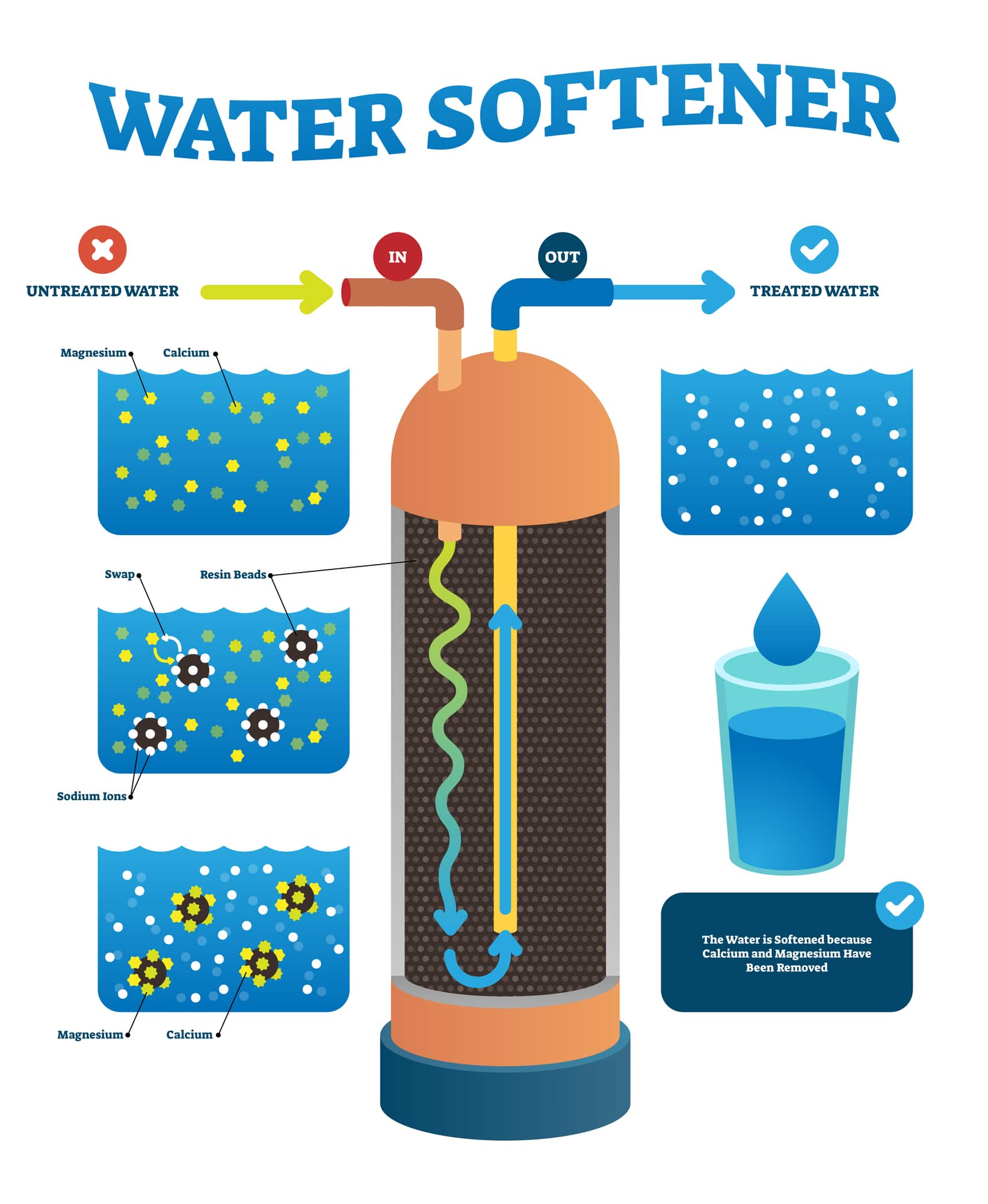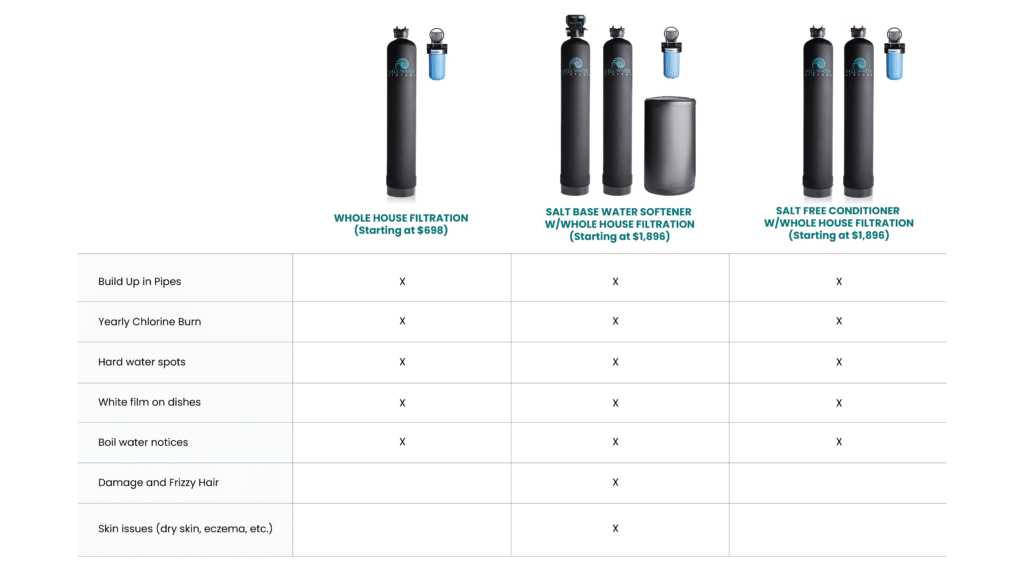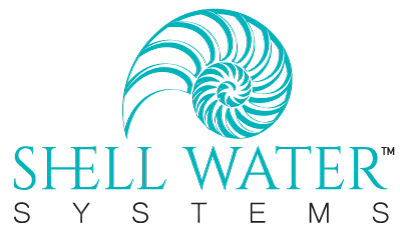A water softener is a device that uses ion exchange to remove minerals like calcium ions, potassium chloride, and magnesium from hard water. Scaling and buildup in drainage systems, appliances, and water fittings can be caused by hard water. Water softeners increase the effectiveness and longevity of these systems by removing minerals, as well as preventing skin irritation and mineral buildup on garments, utensils, and surfaces.
What Exactly Does a Water Softener Do?

Water softening system devices can be salt-based or salt-free, however the salt-free ones aren’t technically true water softeners.
What is Hard Water?
Hard water contains a large concentration of minerals, particularly calcium and magnesium. These elements reach the water supply as it flows through geological formations and soil layers, and they are completely safe for human consumption. However, they can create a variety of issues in both residential and commercial environments. Hard water is a widespread issue in many parts of the globe, and it can be recognized by the accumulation of limescale on fixtures, pipelines, and appliances.
There are numerous detrimental impacts of hard water on our everyday activities. To begin with, hard water makes lathering soap and shampoo more difficult, resulting in product waste. Furthermore, hard water can leave a soapy coating on skin and hair, causing dehydration, irritation, and hair shaft damage. It can also lead to skin problems like acne and dermatitis.
Hard water can cause a variety of issues in the home, including scaling and accumulation in drainage systems and equipment such as dishwashers, washing machines, and water heaters. This accumulation can shorten the lifespan of these products and raise upkeep and cause endless appliance repair bills. Hard water can also leave stains and blotches on plates and glasses and leave garments looking drab and dingy after cleaning.
Hard water can have a detrimental impact on commercial locations such as restaurants and hotels too. Limescale buildup in commercial kitchens can clog pipes and faucets, causing apparatus harm. In motels, hard water can lead to bad encounters for visitors due to skin and hair dryness and discolored water fixtures.
Overall, hard water can create a variety of issues in both residential and commercial situations. Installing a water conditioner can help to alleviate these problems by eliminating the minerals that create hard water, resulting in improved quality water for everyday use.
What is a Water Softener?
A water softener is an appliance that uses ion exchange to eliminate minerals like calcium and magnesium from hard water. Hard water is softened by sending it through a resin layer where minerals are swapped for sodium ions. To keep its ion exchange capability, the resin beads are occasionally recharged with salt.
There are different types of water softeners available in the market. The most prevalent variety is the salt-based one, which use a brine solution to regenerate the resin beads. These water softeners require routine upkeep, such as salt replenishment and brine reservoir cleaning.
To eliminate minerals from water, salt-free water softeners use other methods such as reverse osmosis, magnetic or electrical fields, or chelation. These water softeners require less upkeep but may not be as efficient as salt-based devices in removing minerals.
Using a water softener has several advantages. To begin with, softened water can enhance the flavor and texture of consuming water. It can also help to reduce scaling and buildup in water systems and appliances, extending their life and lowering upkeep and replacement costs. Softened water can also improve the washing and upkeep of domestic items like plates and garments, as well as reduce the quantity of soap and detergent required.
Softened water can also improve personal cleanliness by lowering the risk of skin irritation and dehydration caused by hard water.
How Water Softeners Work
The process of water softening
The ion exchange method is what water softeners use to take things out of hard water, like calcium and magnesium, to make it easier to drink. Sending hard water through resin beads, where the minerals in the water are exchanged for sodium ions, is part of the process of softening water.
At the end of this process, the hardness of the water is lessened. Salt is sometimes added to the resin beads to keep the amount of ion exchange resin at a uniform level.
Overview of the different types of water softeners
There are salt-based and salt-free water softeners which aren’t technically water softeners. The regeneration of the resin layer and the removal of impurities from the water are both accomplished through the use of a brine solution in water softeners that are based on salt.
In order to eliminate minerals from the water, salt-free water softeners utilize alternative processes and technologies such as chelation, reverse osmosis, magnetic or electrical fields, and so on but these are not technically water softeners because they rarely get the job done well.
The components of a water softener system
A water softener system will typically include a few different components, the most common of which are a resin tank, a brine tank, a control valve, and a distribution tube. While the brine tank is where the salt that is used to replenish the resin bed is stored, the resin tank houses the resin beads that are responsible for filtering out the elements from the water.
The control valve is responsible for regulating the passage of water throughout the system, and the distributor tube is responsible for distributing the water in an even manner over the resin substrate.
Benefits of using a Water Softener
- Improved water quality and taste: When the water is soft it is devoid of minerals that can make water hard and disagreeable to consume, such as calcium and magnesium. Water that has been softened tastes and smells better, making it more pleasurable to consume.
- Reduced buildup and scaling in plumbing systems and appliances: Over time, hard water can create mineral accumulation in plumbing systems and equipment. This can result in blockages, decreased water movement, and other plumbing problems. This type of water aids in the prevention of this buildup, resulting in improved water movement and fewer fixes.
- Extended lifespan of plumbing systems and appliances: Mineral accumulation can also cause corrosion and other harm to water systems and equipment, reducing their lifetime. Soft water aids in the reduction of this accumulation, resulting in more durable systems and equipment.
- Reduced maintenance and repair costs for plumbing systems and appliances: Soft water can help to reduce the need for upkeep and fixes on plumbing systems and appliances by avoiding mineral accumulation. Over time, this can result in substantial expense savings.
- Improved performance of personal care products such as shampoo and soap: Personal hygiene items, such as shampoo and soap, can be compromised by hard water. Soft water enhances the effectiveness of these items, resulting in healthier skin and hair.
- Healthier and more comfortable skin: Dryness, itchiness, and other skin irritations can be caused by hard water. Soft water may help rid you of these problems, resulting in better, softer skin.
- Reduced risk of skin irritation and dryness: When compared to hard water, soft water requires a smaller amount of cleanser and detergent to achieve the same level of cleaning. This may result in financial benefits as well as a reduced impact on the surrounding surroundings.
- Reduced need for soap and detergent: To accomplish the same cleaning outcomes as hard water, soft water needs less soap and detergent. This can lead to expense savings and a smaller environmental effect.
- Improved energy efficiency of water heaters: The accumulation of minerals in water heaters can reduce the efficiency of the heating process, which in turn can result in higher energy bills. The protection of this buildup can be aided by using soft water, which will ultimately result in more efficient water heaters and lower monthly energy costs.
- Reduced water spotting and streaking on dishes and glassware: Water spotting and streaking on plates and glasses can make them appear unclean even after cleaning. This problem can be mitigated by using soft water, which results in cleaner plates and glasses.
How to Choose the Right Water Softener?
Choosing the correct whole house water softener for your home can be a difficult job, as there are numerous kinds of softeners on the market. Salt-based, salt-free, and magnetic water softeners are all popular kinds.

Each type has advantages and disadvantages, so it is critical to study and compare them before making a choice. Some factors you have to consider when when choosing the right water softener are:
- Water hardness level: The sort and quantity of water softener you require will be determined by the hardness level of your water supply. You can test the hardness of your water with a testing kit or by calling your local water company.
- Water usage: The amount of water used by your household each day will help you determine the capacity of water softener you require. A bigger family will need a higher capacity water softener to be able to do the job well.
- Water softener type: Salt-based and salt-free water softeners are the two primary categories available. The water softeners that use salt as their primary ingredient are by far the most common and much better at softening the water.
- Regeneration cycle: The frequency with which a water softener’s regeneration cycle must take place in order to clear away built-up mineral deposits is referred to as the cycle’s “regeneration cycle.” Even though a shortened regenerative cycle has the potential to be more effective in preventing mineral buildup, a longer cycle has the advantage of being more convenient.
- Maintenance requirements: Certain water softeners call for regular maintenance, such as replenishing the salt supply or changing the filter. Think about how much maintenance a water conditioner needs before you go out and purchase one so you can make sure it will work with your routine.
- Budget: The cost of a water softener can vary greatly, with salt-based systems typically costing more than salt-free systems. When selecting a water softener, consider your budget, but bear in mind that a higher-priced filtration system may save you money in the long run by lowering upkeep and repair costs.
- Brand and reputation: Select a reputable company that has a track record of making high-quality water softeners. Look for consumer feedback and evaluations to ensure that the water conditioner you select is dependable and effective.
- Installation and warranty: When selecting a water softener, consider the installation procedure and the manufacturer’s guarantee. Check that the device is simple to install and comes with a warranty that will provide sufficient security in the event of a problem.
Conclusion
In conclusion, a water softener is an appliance that can remove hardness minerals like calcium and magnesium as well as other minerals from water, resulting in softer and better grade water.
Hard water can lead to a variety of issues, including scale buildup, reduced device effectiveness, and dry skin and hair. You can experience the advantages of soft water by investing in a water softener, such as cleaner dishes and laundry, longer-lasting equipment, and better skin and hair health.
Access to pure, soft water is essential in our everyday lives, and a water conditioner can help with hard water issues. As a result, it is critical to consider purchasing a water conditioner for your house or company, taking into consideration variables such as water hardness, device size and capacity, and budget. You can enhance the quality of your water and experience the advantages of softer, cleaner water in your everyday life by doing so.
Frequently Asked Questions (FAQs)
How often do I need to add salt to my water softener?
The regularity with which salt is added to a water softener is determined by the size of the device and the degree of the hardness of the water. A home water softener reservoir should be refilled with salt every 4 to 6 weeks. However, it is advised that the salt level be checked on a frequent basis and that salt be added when the level goes below one-third full.
Is it safe to drink softened water?
Water softening process does not introduce any harmful chemicals to the water, so drinking soft water is usually deemed harmless. Due to the higher sodium level, some individuals may find the flavor of soft water unpleasant. It is essential to note that soft water may not be appropriate for individuals following a low-sodium diet because it may increase their daily sodium consumption. In such situations, a distinct tap for unsoftened water or a reverse osmosis device for drinking water can be added.
Can a water softener remove other contaminants from water?
A water softener is mainly intended to eliminate hardness minerals from water, such as calcium and magnesium. While it can decrease the amounts of some other pollutants, such as iron and manganese, it cannot remove all contaminants, such as bacteria, viruses, and chemicals.
How long do water softeners last?
The lifetime of a water softener is decided by several factors, including the quality of the device, the level of maintenance, and the level of hardness. On average, a well-maintained water filter can last 10 to 15 years. However, some high-end models can last for 20 years or more.
How can I tell if my water softener needs maintenance?
When a water softener needs maintenance, the water flow slows down, the water gets harder, there are salt bridges or clumps of salt, or it makes strange sounds. If any of these things happen, an expert worker should be called to look at the gadget and fix it.
Can a water softener be used with a septic system?
Yes, a water softener can be used in conjunction with a septic system. But it’s important to choose the right kind of water filter and keep it in good shape if you don’t want it to hurt your system. Some softeners that use salt can make the sewage have more sodium, which can hurt the microorganisms in the septic tank. Because of this, you should use a water filter that is made for sewage systems.
